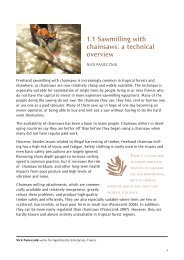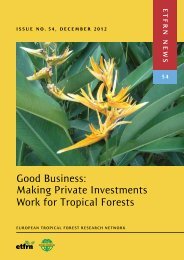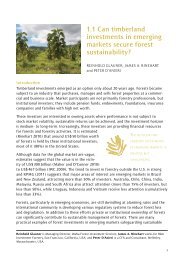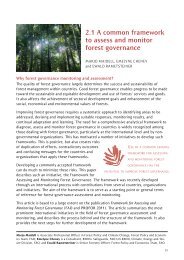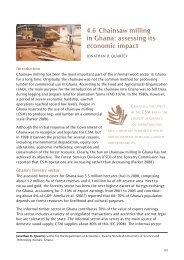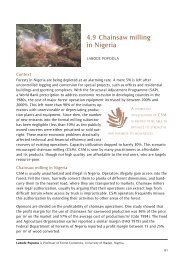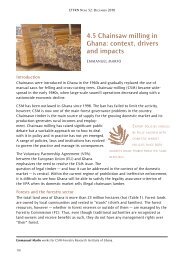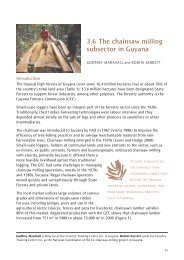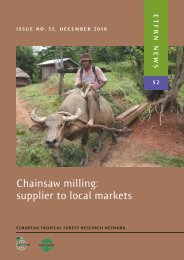Chainsaw milling: supplier to local markets - European Tropical ...
Chainsaw milling: supplier to local markets - European Tropical ...
Chainsaw milling: supplier to local markets - European Tropical ...
You also want an ePaper? Increase the reach of your titles
YUMPU automatically turns print PDFs into web optimized ePapers that Google loves.
Table 1. Forest contracts and permits<br />
4.8 chaiNsaw milliNg aND NaTioNal FoREsT policy iN libERia<br />
type of forest contract/permit description<br />
Forest management Contracts<br />
(FmCs)<br />
for forest areas of 50,000–400,000 ha for 25 years, <strong>to</strong> be<br />
managed for long-term sustainable timber production<br />
Timber sales Contract (TsCs) for forests of 5,000 ha or less in off-reserve areas for<br />
three years that are destined for conversion <strong>to</strong> agriculture,<br />
awarded <strong>to</strong> companies having at least 51% liberian<br />
ownership<br />
Forest use permits (Fups) intended for non-timber forest uses (e.g., <strong>to</strong>urism and<br />
harvesting of nTFps)<br />
private use permits (pups) for regulating commercial forest activities on private land<br />
The nFrl makes provisions for benefit sharing with regards <strong>to</strong> commercial logging<br />
revenues and requires a social agreement, which defines community benefits and access<br />
rights, <strong>to</strong> be developed for every forest contract.<br />
<strong>Chainsaw</strong> <strong>milling</strong> is considered illegal, as it does not fall under any of the contracts and<br />
permits established by the nFrl. by extension, the collection and payment of fees related<br />
<strong>to</strong> Csm is also illegal. The FDa collects fees for the issue of official waybills, however,<br />
allowing chainsawn lumber <strong>to</strong> be transported <strong>to</strong> monrovia and thus giving the practice a<br />
quasi-legal status. <strong>Chainsaw</strong> <strong>milling</strong> is also banned under FDa regulation no. 26.<br />
chainsaw <strong>milling</strong> and supply chain analysis<br />
in liberia people use chainsaws <strong>to</strong> convert the logs from<br />
felled trees in<strong>to</strong> planks on site. The planks are then handcarried<br />
<strong>to</strong> the roadside for packing in<strong>to</strong> vehicles and<br />
transport <strong>to</strong> <strong>markets</strong>. a <strong>milling</strong> team is usually composed of<br />
one chainsaw opera<strong>to</strong>r and an average of two helpers and<br />
five wood carriers. some groups also employ cooks, bush<br />
managers or tree spotters. a study of the practice (blackett,<br />
lebbie and marfo 2009) indicates that 67% of the workers<br />
come from <strong>local</strong> communities, 32% are other liberians and<br />
only 1% are foreign. most teams operate with a single saw. 3 about 76% of the opera<strong>to</strong>rs<br />
claimed <strong>to</strong> own their chainsaws; financiers (including wholesale buyers and traders in<br />
chainsawn lumber) owned 23% and communities owned 1%.<br />
<strong>Chainsaw</strong> millers normally operate in partnership with traders and <strong>supplier</strong>s, although<br />
timber loads may be brought <strong>to</strong> monrovia or other <strong>markets</strong> and offered on spec <strong>to</strong> timber<br />
traders. planks are usually carried up <strong>to</strong> five kilometres (km) <strong>to</strong> the roadside for loading,<br />
but in a few cases are carried as far as 10 km. Trucks are generally loaded with about 500<br />
planks or 24 m 3 . Timber is transported for an average of 178 km <strong>to</strong> monrovia timber<br />
<strong>markets</strong>, but transport from as far away as 700 km has been reported.<br />
175



